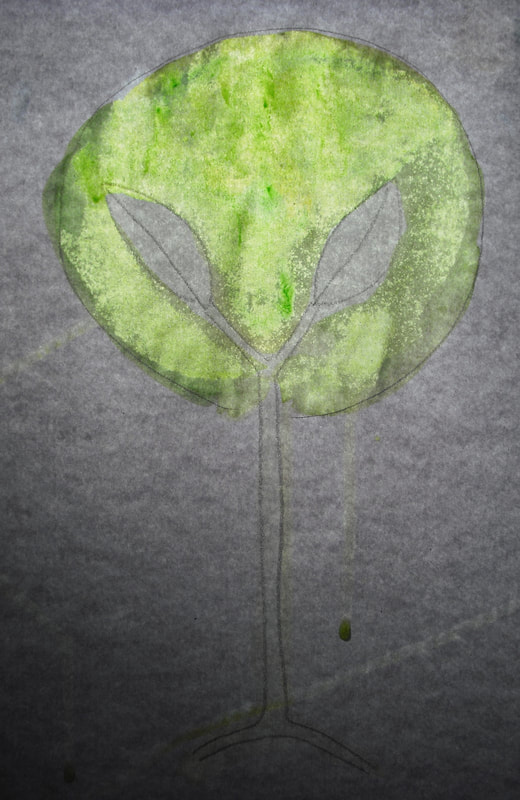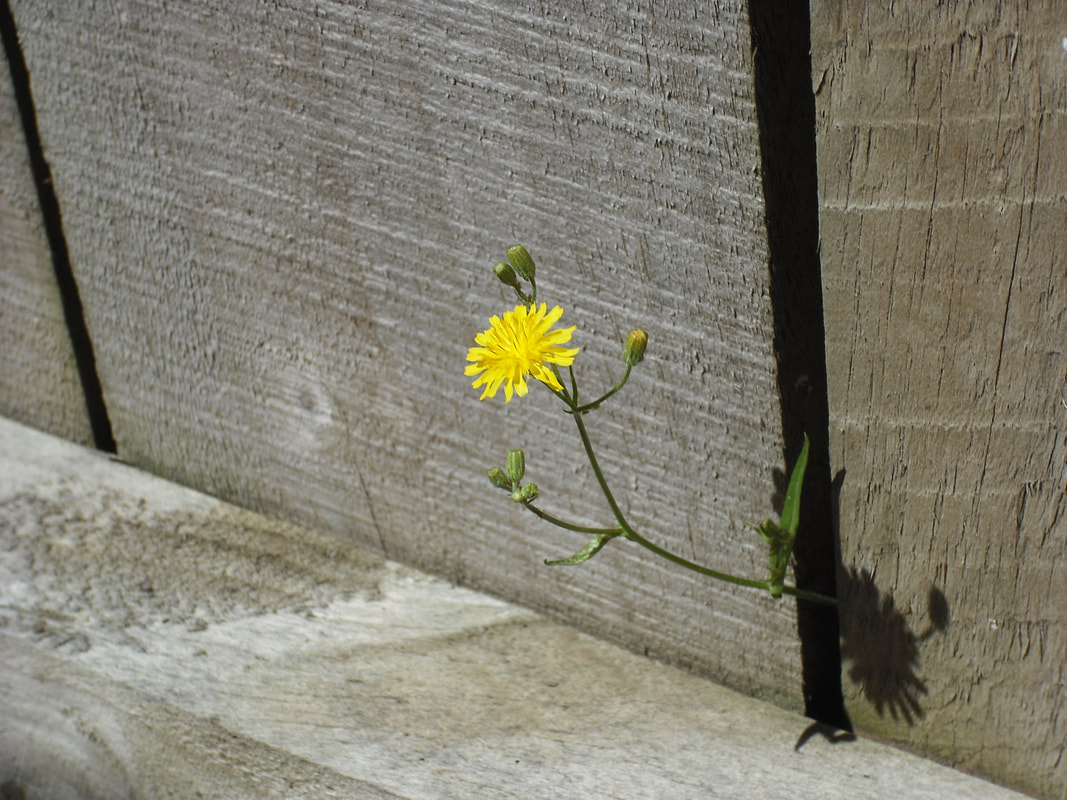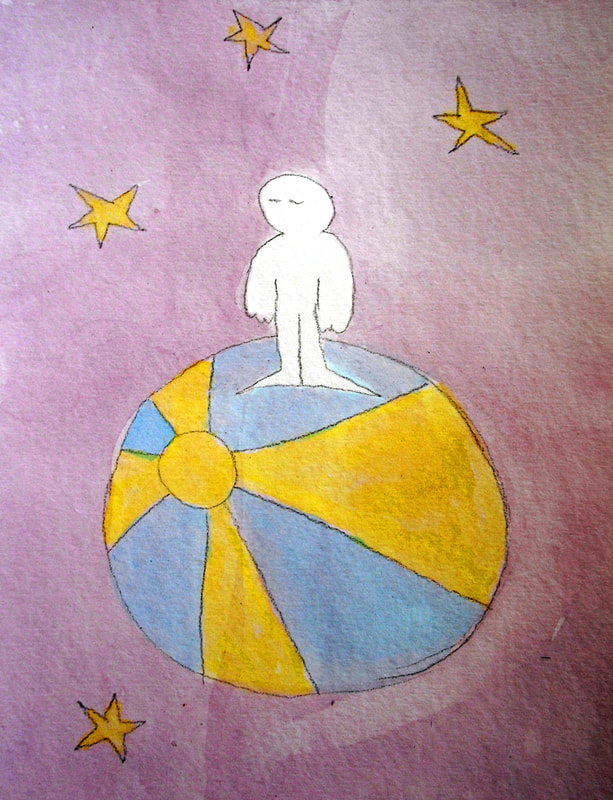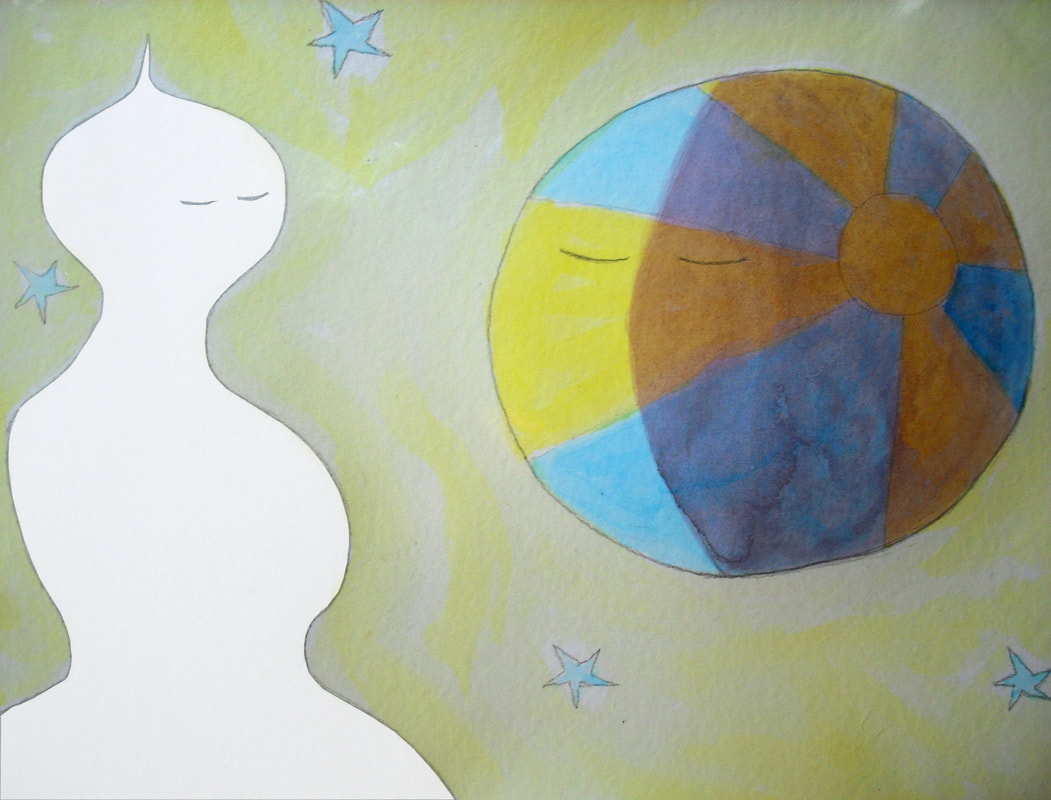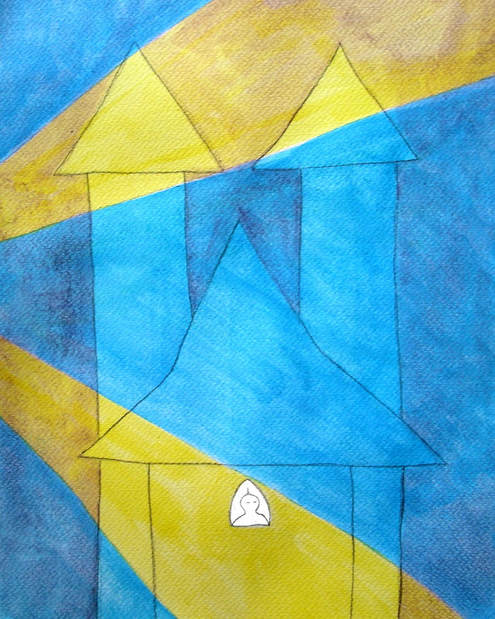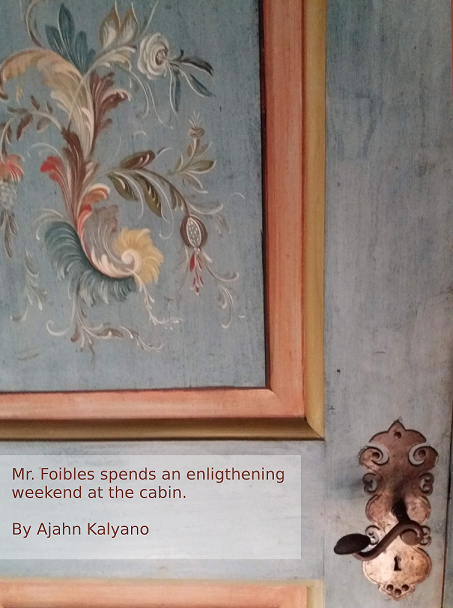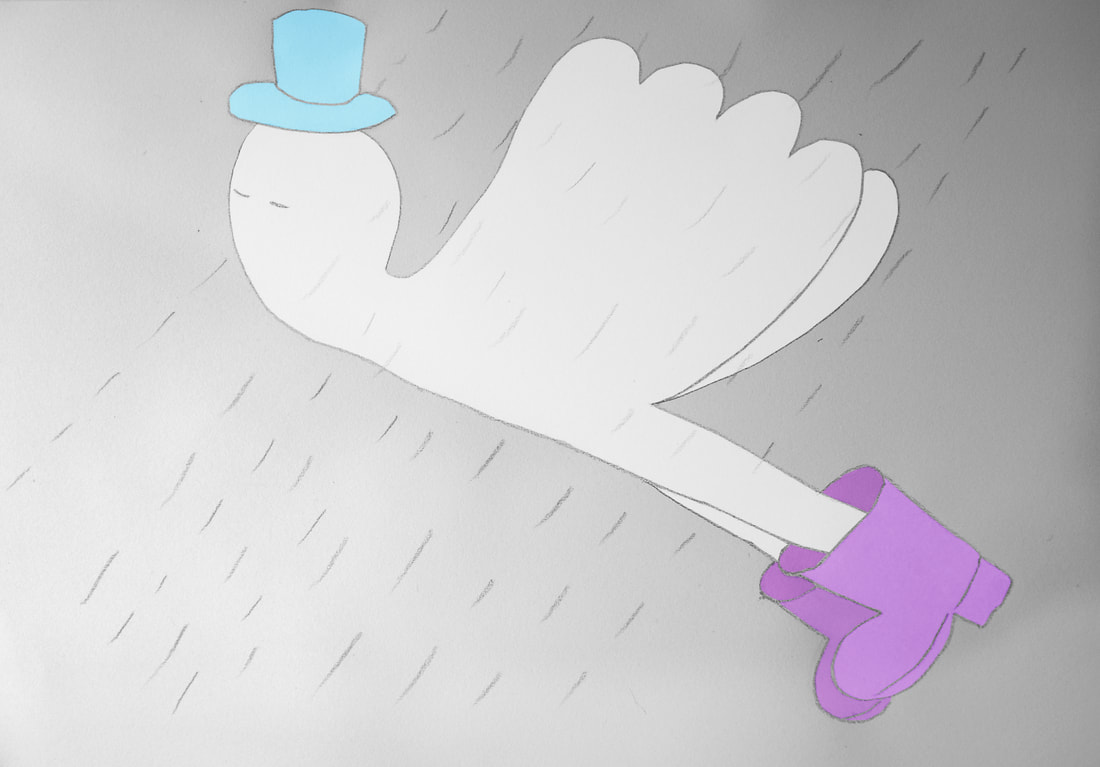|
Why is it that we feel so good when we go out into nature? There is more to nature than relaxation, than fresh air and exercise, more even than the beauty, isn’t there? We feel somehow at home, don’t we? How so? This is because our bodies are part of nature too. We realise this if we see that the more we are aware of the body the more we feel at one with nature. If we meditate, watching the breath coming in and out, it can seem to be like the breeze and suddenly we can feel part of something bigger. We can also discover that when we do this that our worries, even at a time of crisis, begin to fade. This is the case even when it is our bodies or our health that we may be anxious about with this virus around – in fact it is especially the case at such a time. Somewhere very deep down we can intuitively be accepting our situation as human beings, our place and finding an inner peace. Then, returning home, if we can stay with the body, this peace will remain with us. We will feel calm and centred and prepared for whatever may come. Maybe deep down you knew all this already, that’s why you headed for the forest whenever you could. But did you realise the importance of being aware of the body in finding the peace you were looking for? And did you realise how deep it could go? This is part 1 of the "Nature Series". 1. A walk in nature 2. Finding our place in nature 3. Hello nature 4. Our goodbye nature 5. It's never too late to love the world 6. True love for the world In seeking both our own well being and that of the world we live in it is not just what we do that is important but how we do it, both in terms of our outer behaviour and how we work with the mind. If our personal relationship to the world is based on desire there will always be potential conflict. If this relationship is based on a higher mindfulness, conflicts can be avoided. We can have the same benevolent intention either way but one way will be fraught with suffering and the other free of suffering.
In Buddhism virtue is based on letting go of desire. We follow the conscious, peaceful mind in the present, not the automatic pilot of desire. We discover the joy of letting go of our desires and following our mindfulness, our spiritual awareness. This is based on the fact that if we honestly observe our own minds we discover that our desires are essentially insatiable. The impermanence of the pleasures of the senses always ultimately frustrates our desire. We also realise that our desires, in the spur of the moment, cannot see that impermanence. This makes desire itself unpleasant and we naturally opt for calm, for peace and for freedom from desire. This, we further discover, can be very liberating. We realise how our desires have been enslaving us all along. If we can thus let go of our desires and enjoy the peace and freedom that ensues it becomes a joyous thing to live humbly and frugally in harmony with nature and have no conflict with other people. There seems to be a growing acceptance of the fact that the earth is beginning to struggle to accommodate the needs – or, lets be honest – the outright greed of modern man. We can then, perhaps, ask such questions as:
1. What can be done to cure the greed that could lead to humanity's destruction? The overcoming of greed is a central theme in the teaching and practice of Buddhism which is thankfully beginning to find a stronger voice. We are trying to promote a more interdependent view of the world that generates empathy. What we can add to this is firstly that spiritual pleasures, meditation for example, are very eco-friendly; secondly we can give more emphasis to the value of disciplined conduct on the part of the individual. The practical value of this is, of course, recognised, but the power of such discipline to deeply change our relationship to nature is often underestimated. I lived in the tropical forest for years, not permitted by my monk's discipline to kill insects. Over time this transformed my relationship to the ants and mosquitoes that were a constant pest – and consequently to the whole environment into one of harmless communion. 2. What about the helpless anger or despair of the sufferers of this greed? Are there, for example, hidden causes here for the apparent increase in delinquency amongst young people? Or are my eyes on the world just getting too old and sensible? I believe that Buddhism as a source of faith and as a deep psychology can help us understand and manage the emotions related to death or impermanence. It is surely these emotions that turn us away from facing the issues. In Buddhism we teach people both the wisdom to let go of attachment to things and the compassion to stay with those things, hence winning a lighter and more caring touch on life: Recently we had someone come to the monastery to commemorate the recent death of their favourite Aunt. When the ceremony was all over they were trying to talk to the monks but their little girl would not settle. An elderly lady friend of ours in the room was pointed out and recommended as her new Aunt, saying, “there are lots of them in the world.” 3. What if the planet cannot be saved? Then where are we to find hope? We can perhaps see for the first time in the current context how humanity up until now found this in ‘the new generation’. Then what if there were to be no more mankind? Perhaps we find hope in the preservation of human knowledge – the computer chip blasted into space? Yet so much of this knowledge surely concerns and is hence based upon, the earth that may be lost. The earth that one day, however long in the future, must be lost. To me our greatest if not our only eternal hope is the Dhamma. Dhamma is a source of universal truth. If we can see the full potential Dhamma as it really is, as a part of nature that can never be destroyed, we can have hope. We have a new purpose in life promoting this understanding, this faith in ourselves and in others. If we get this right this is in no way a negation of the transitory aspects of nature. It is rather seeing the Dhamma as the highest expression of nature, its highest evolution – the way that an aspect of nature, one that I believe can be formative, can truly find a permanent basis. I would argue that the enlightened mind, free of limitation in time and place, is capable of reaching back out to the universe, so to speak, from its refuge in the beyond. I think it is possible to argue, based both on philosophy and the experience of deep meditation, that this can be true. This is not a such a simple matter, however. We need to find a number of ways, philosophical and meditative, through which we free up the mind from its material constraints. I have tried to tackle this in the recent book 'Virtue and Reality'. Just to try to give you a taste, to quote from Gregory Bateson: “...a miracle is a materialists idea of how to escape from materialism... the reply to crude materialism is not miracles but beauty.” - Mind and Nature To learn how to understand like in this quote can also be to see like this and to find a new depth of appreciation for nature. This is to see with the quality of 'muditā' (sympathetic joy) at nature's achievement. If we can find faith in all this as a possibility, we have a hope in those enlightened already and those to come as being able to take human consciousness forward beyond its material constraints. We see the Earth is the perfect training ground for the mind striving for enlightenment and therefore we do whatever we can to preserve it. Having a few more enlightened beings in the world already will also certainly help to preserve the Earth. Interestingly, many Thai Buddhists believe that while there are enlightened beings on the Earth, the Devas (heavenly beings) will protect it from destruction. This is inspiring but I hope such beliefs don't take the place of ecological responsibility on the human level! To sum up, in addressing these three questions I hope we have done something to tackle the human greed, hatred and delusion respectively that are both at the source of the ecological crisis and are the results of it; they are indeed the forces behind this destructive cycle as a whole, as they are behind all other suffering. How do we fit together the different strands of the Buddhist attitude toward nature? On one hand there is the truth of interconnectedness, an attitude of respect and harmlessness; and on the other hand a goal of transcendence, to escape from the suffering of samsara. Surely, we might think, one is positive and the other negative? Are they reconcilable?
Let us take the tragic yet also ultimately liberating truth of the impermanence of all things as the central view of Buddhism and look from there. First of all we can understand that it is a positive, loving view of the world that sees impermanence as a tragedy. A negative view of the world would see impermanence as a good thing, good riddance. Have we been too quick to assume that a negative view of samsara is a negative view of the world? Secondly, have we too quickly made the mistaken assumption that liberation comes about through having a negative view and trying to get away? Liberation does not come about like this at all. There is no place for negativity in the search for transcendence. The Buddha describes trying to get away like this (through 'vibhava-tanha') as like a dog tied to a pole trying to get away by running round and round it. This is not the way. We cannot escape through desire. Liberation comes not through trying to withdraw from this world but through examining it clearly and completely with a peaceful, open mind and penetrating it to its very core. The natural result of this will be to let go and find freedom from attachment and suffering, not somewhere else or at some time in the future but right here and now. To be capable of this the heart must not only have the wisdom to see suffering clearly but also the compassion to see suffering and stay put. The real purpose of Buddhists withdrawing into nature is not to try to get away from it all but precisely this kind of examination. The deepest truth is to be found in our relationship to nature and to our bodies that are part of nature. The only true way out is to truly enter in, with open and compassionate eyes. If this is our understanding and our practice there is no contradiction between our love of nature and our search for freedom. Freedom will be the essence of all things. Buddhism offers us the hope of finding a safe refuge beyond the body in the blissful emptiness of the mind through letting go. Thus to a Buddhist who has faith the response to the possible end of the world or to the end of our lives is the same. Meditate and practice Dhamma before its too late! For those with less faith in a possibility of life after death but faith enough to meditate, the same practice can still win the refuge of a source of peace and stability of mind through difficult times.
Our first refuge will be the natural mindfulness that comes from virtue, from a lack of remorse that takes the mind into the past and a letting go of the desire that pulls the mind into the future. This path of faith culminates in samādhi that seems a bit like finding a way within our minds to blast off into space! Yet where will we end up? Do we know? And what about the world? If we add wisdom to such faith we realise that we can find a safe space, a deeper refuge within the world. If the world survives or ends we can we stay right where we are, within the empty mind. Then we know where we will end up. We will end up right here. We can get to know this emptiness here and now and find that it is naturally full of spiritual qualities. We find out how this emptiness relates to any phenomenon that comes within it in a way that it remains empty and free. We learn how to relate to all the movement of the world and remain still, at peace, secure. Then, here in this down to earth spirituality, compassion also flowers and the practice becomes wider, not just about meditation. Then wisdom takes us to the highest refuge. This is the wisdom that sees the impermanence of all things and lets go. The mind that lets go like this is then not withdrawn but detached, the mind is in the world but not of the world. And yet to see and let go completely the mind must be able to look on from a secure refuge. Building such a refuge is therefore our task. "This is the story of a full immersion experience. I recommend you retreat to your own cabin in the woods, or a deserted beach. If that's not possible hide out in the bathroom or broom cupboard. Give it quality time and attention. Life changing potential is much closer than you imagine." - Tim Price. By: Ajahn Kalyāno (with a little help from The Son of the Elk-Rider) At weekends Mr. Foibles leaves his business in the city and seeks peace in the forest. Mr. Foibles stayed at his cabin in the mountains. It was a log cabin of traditional style with a grass roof. In the summer this was heaven. The forest stretched across the mountains as far as the eye could see. One could feel as though one could roam freely forever and a day. By day he roams the forests – like a daring tourist returning to his customary resort – and by the night he would observe the stars, in an attempt to integrate the vastness of the universe into his own very heart. Arriving at this cabin was to Mr. Foibles perhaps somewhat similar to when orphans discover their true parents – an occurrence of reconnection with the heritage and fold which fate had ascribed, after having it concealed by the surges of the turning tides. The cabin´s flagpole that served to raise the spirits with a defiant flag in the midst of winter was like a mast to a cabin afloat in the vast forest, the hills like the waves of the sea. The ship's bell that could call a helping hand lay silent in the safety and abundance of the summer. It would seem it would last forever. The grandfather clock stopped long ago and stands as if frozen in time. Only the rusty iron speaks of time from stillness, the sailor's chest that reminds of travels long past, extending the mind's horizons. The upright chairs speak of manners at dinner, the armchairs, thread-bear and sagging of the rest of a working man. His cabin was old with many paintings on the walls. Was this an expression of love manifested and made visible through a perfect symbiosis of diligence, artistry and meticulousness; or was it a vain sensualism? Or could it be either depending on the eye that was looking? The decoratively painted doors were to Mr. Foibles like the doors to his inner heaven. From the verandah the scent of pine reminded him of summer days fishing with his father. This was a world of its very own which, wrapped in the innocence of a child, always held a freshness in his mind. In the valley beneath the veranda two women were raking hay by hand and chatting with each other. They were Mr. Foibles neighbours. Sceptical onlookers would claim that they are trying to impose an outdated and ancient agricultural method, with its essential discomfort and inefficiency, on the world, sneeringly calling it silly nostalgia and eccentric waste of time and effort. Mr. Foibles, however, would now profess in the luxury of his summer leisure, that these women had re-attained a small piece of humanity's lost position in nature. Thus, not evading the real world but reconquering their place in the real world. Thus on this historical day he had finally taken a stand which, unknown to him was, over the next days, to shift his whole perspective on life. As usual some of the neighbour´s sheep had greeted him at the gate on his way to the cabin. His reflections brought them back to mind with new affection. The sheep were of an ancient mountain breed. Carrying their horns raised their heads into a strong and dignified pose fitting of their history of endurance as their hooves danced nimbly across the rocks or planted themselves in the field as they stood and stared, their eyes lacking penetration yet soft and present. Would the sheep, being of the new generation, recognise the traditional methods of their masters? Would their minds be somehow preserved in a primordial state to be expressed in the quality of their gaze? Here the sheep together with elk and deer are free to roam, while man is chained to these wooden boxes, with all their comforts, to be able to survive the winter. Through their reticent endurance the animals have made themselves supreme rulers, resembling spiritual seekers in their wilderness abode. Hence the softness that comes into their eyes and the pride into their horns. This is a place where nature is king and man is but a poor immigrant. And the wooden structures of the human dwellings are but a loan from nature, which nature would in due course reclaim, according to its uncompromising law. In the cabin the books, board games and jigsaw puzzles speak of the dark winter nights, of the refuge in the world of the imagination and the fairy tale. Gradually the refuge, inner and outer likewise becoming a prison. The stoves and the candles, the warm winter lights flicker and throw shadows on the ceiling, the world jumps and falters like a nightmare that could draw us to delusion or even derangement. The inner vision must awake and remain awake. But still if the cabin is used as our safe haven during winter, would not that in itself constitute a divorce from nature and from reality, he wondered. Would it make the cabin into our whole world during the cold nightly snowfalls. He was to discover that then only the body can remind us of our true haven and true nature. The body within which, he would find, the true spirit resides. Now it was high summer. Nature flourished all around. Yet his encounter with the sheep and the reflections that followed had left him in a contemplative mood. Simply to the soft, present eye the tall pines and the delicate flowers merged into a single, open, unified image. Going for his daily walk he knew the way, a gentle intention could find its way along the path. If the touch of intention remained light and open, the image of the forest remained clear and open in his mind. “And the wild flowers are so beautiful” he thought. Yet when desire thus entered and placed its focus within the scene he was tempted along the way through feeling. The mind merely used the senses of the body to enter the world and the body, part of nature, was just a tool. This was a coming together of the organism on its goal yet it was a union merely at a point of feeling which as a part of the mind pointed back only at the mind and did not truly open into the world. Only when he stood still did the mind open and notice the stillness and peace of space that mirrored the spirit, settled in the moment. He felt so alive, so free. Mr. Foibles had always taken desire to be like life itself. Now desire was showing itself to be the thief of a new life that he did not yet know he had. He continued his walk feeling inwardly a little disorientated. This part of the path was rocky and as he felt himself stumbling. He was cruelly reminded of the agility of the sheep and felt suddenly somehow lost, defeated. Now in this moment of loss he had his first inkling of his new world. In the struggle to find his footing and to re-establish his sense of presence it was as though the new space of his mind was brought into the body, his movements became natural and fluid and, still half unknown to Mr. Foibles, he sensed for the first time in his life what it was to truly be a human being. The space that surrounded his body seemed to shine with the light of love into the forest. Mr. Foibles loved the forest, but suddenly he questioned whether the forest loved him. Imaginably the forest rejected him on the grounds that in the past he had turned it into a kind of museum through his passive awareness that merely catalogued the species and added nothing. “The forest has given me so much,” he thought. Perhaps it could forgive him for taking firewood – so abundantly did it replenish itself and he knew that he must do this to survive the winter, or rather he must do this for the sake of the body. He felt humbled and a little melancholy. Returning from the walk, the cabin he now clearly saw as the home of his mind, the creation of his mind and the minds and hearts of others, the carpenters and the painters. The cabin was a world controlled and arranged from which he ventured forth into the vast uncontrolled and non-arranged expanses of nature. Here the mind catered also to the needs of the body and it was this aspect that now came mysteriously to the fore. He washed and rested his body and gave it a little food, wondering what it really liked, after all. He went to the toilet, laughing out load at the little splashes made by his pooh entering the water. The body, he realised, could not be controlled and arranged like the chairs. This tool of his mind had its own demands. The body had a life of its own, like the trees or the deer of the forest. There was another shift of heart, an acceptance. Here at the body, the mind experienced the elements only to find the warmth of the body and the warmth of the sun the same. Likewise the man-made warmth: the heat of the campfires of the North-American Indians – where the brave warriors of a lost civilisation would contemplate and form their destinies, or the heat of the saunas – where the successful captains of the market settled lucrative deals which would cause obesity and a hollow fulfilment in some and resentment and jealousy in others – were also a part of this same warmth. And yet the passions and pretensions of the mind seemed quickly to lose the simplicity of the moment, rippling the stillness of the image and throwing up the despair of an inner vertigo. When he grasped a view, the view grasped him. Only in the innocent comic book of the child could such expanse be won within the image, free of the history of feeling which was the hook of craving. He quickly got out of his chair, feeling the need to play like a child and shake off the passions. At the body with its expressive posture and movement he found a reaction over which the mind held control. In its composure was a deeper coming together, one that truly listened to the world. He danced into the forest. This forest had held an unbroken peace for many centuries, he thought. But was it a peace achieved by the rule of law, or was it the natural peace growing from an inner spiritual reality? Mr. Foibles had always thought that a life of discipline would be a life of oppressive misery. And yet his very own body could be the home of the spirit, free from desires and a source of compassion and moral sense, of a wise and natural inner discipline. The empty swings that once carried the excited screams of children he offered in his mind to carry the swings of moods he no longer required. Coming together further in feeling were his mind and body. Yet there was no excitement that did not agitate the body's quiet repose. Only in stillness could an image truly mirror reality and within it hold a sense of space that held its own joy, the joy of freedom. He went back inside and sat. For once in his life he sat still. Usually to sit would also be to think but he had realised too that there was no need for him to carry the world in his mind, with all its innumerable particulars, in order to understand. Only the reality of what is mattered, there was no need to form a mental image to achieve an understanding of existence. Furthermore Mr. Foibles had found that the simple experience of his own body, perhaps surprisingly, was all that was needed to attain to a deeper, primordial knowledge – and this was something which would not be imagined but would arise spontaneously from reality. The quality of this vision was surprising too: like the vision of a saint within the space of the mind as it grew to clearly know the body, the mind no longer trapped in the body but the body sitting in the bright bubble of the spacious mind. Although Mr. Foibles felt clearly that he had entered a new world in his mind still outwardly he returned to his habitual weekend fashion. He would carry his new found peace with him, he thought. He picked up a magazine he had brought with him. Suddenly the wind was stirred up, grabbing a hold of the magazine. He momentarily panicked and the stillness of his mind was lost. As he held on tight, doubt gripped his mind, what was he doing? He realised at once how attached he was to his entertainment and to his reveries, yet the grasping contraction of his mind still took him and he felt like he was falling into darkness. Was feeding the imagination merely creating a false world inside, a world of phantoms that haunted his eyes? Am I merely led to compare myself with a dream or this place with a utopia as vague as if portrayed in a foreign tongue? His mind turned again. “Yet do I not need to imagine to plan and decide my course in the world?” he thought. “Imagination comes only to support weakness of vision,” came a thought from the space of his mind. “And outer vision may be brought within if the mind is empty, full of space. Such is the relinquishment that gains everything,” he thought. He paused and lit his pipe. Within his silenced gaze a humble love of simplicity and a sense of balanced and orderly composition arose, the particulars unimportant, and the ordinary became imbued with a new significance and luminosity, turning it, in that very moment, into the pinnacle of all that has ever been and will ever be in the world. For that vision will have space and light in the very same way that it holds form within an integrated whole. This whole then becoming peace to a mind that no longer needed to run around to gather and form a picture. This was a very different kind of beauty, a beauty of order, an order that expresses a deeper meaning than the transient object. An order that, free of sensuality, does not close the heart to a point of feeling but opens the heart to a truer love. This is a love formed by the selfless heart and eye, not by the object but by an extension of the heart into the world of the mundane. Free from the limits of external form it could find itself even in the lowliest of places – unconditional and unconditioned. Free also of the theory that will always generate doubt and then anguish, this spiritual aesthetics takes the mind beyond the aesthetics of the world – the ordinary like a bridge to the beyond. For what must we seek, when our eyes are beautiful we may see beauty wherever we look? This new vision in turn allowed the mind, abandoning sensuality, to find a natural moral sense and sensibility. The big rusty barbecue had been to him like a union between the primeval nature and the vanities of industrialism. But now that he had realised that he had a body, and the body also had him, he started to sense an aroma of guilt that tarnished its very core. The meat spoke back to him from the grill and he resolved, no more. With such a resolve he felt a sense of being at One with the world, not through sensuality but through a loss of the sense of self, through a freedom of mind from self concern that opened his heart to a wider sphere. “Here at he body the two worlds truly meet, the world of the mind and the world of nature,” he thought. “There must lie the whole truth, the unified picture in which his mind could rest from its endless wandering, from its endless efforts to paint a coherent picture within the mind. “ He sat in his armchair and sought to direct his mind into the body. Yet he could not regain or intensify this state through desire. To try to place the mind here at the centre, at the bodily intersection was not then the great coming together. For the mind to touch the body and find feeling was a moment of over-sensitivity and despair. The mind turned to stimulate itself could form no coherent image. Feeling as an end in itself was both confusing and compulsive. Only when the mind was able to form an image of the real body, in place, was there a return to sanity. Yet even then the feelings would call, like a temptress until the mind went calm. Only then could the mind find itself clear and open and the objects both of the world and the mind find their place within its open geography. He sat on. When he next arose it was already dusk. Looking down into the valley the women were still working and he felt closer to them than ever before, closer than all his admiration could take him. He realised that the simple, clear presence of his own body was a bridge to his fellow man. No longer divorced from his companions and locked into the world of thought, nor closed into the world of personal feeling, his mind was truly empathic. New open feelings emerged from a clear image, not merely an evaluation – given not merely taken, they had a new life and love, strong and free. From now on he determined to take his body wherever he went to find this union and to cool his fevered mind. He stood and walked to the window. Looking out into the garden it was as though his thought was then part of nature through the cabin and the armchair the same as through the hammock and the woodpile, adding new meaning and consciousness to that of the forest. Losing the sense of inner and outer. No longer did he hang on to his creations - the wood carving or the sledge no longer took on an excess of meaning from his proliferating mind. Meaning that could find no place in the world but merely turned endlessly within his mind without rest. Instead nature was drawn within by the harmony of inner and outer. He had a place and a purpose. Yet his sense for the body left him cool and calm, free of desire, at peace. The life of the body was simple and humble and gave a new perspective to the ambitious mind. He pottered around the cabin. The stoves and the heavy beams spoke of the winter darkness usually denied in the rush of summer. He knew without thought that he must prepare the firewood. He found himself taken to the workshop. The axe swung straight and true, this chore was now a natural integration of mind and body, his action arising out of a perception of the world not out of desire or worry. It was part of the seasonal pattern, the cycles completed externally in an accepted history becoming the cycles of thought and action completed inwardly. And riding parallel in the mind a higher meaning could find the space previously occupied by the proliferations of life. For the mind seemed to find in this space a new existence, a light that could both guide and penetrate. A light lost with grasping or holding and brighter with letting go as though the hand of work were now also the gestures of an inner moral sense in a life claimed back from the spasms of desire. And to play with the world and the mind together reached a new understanding beyond that of desire. A new understanding that was itself beyond desire. To try to work it all out was to find trying working things in and out of his mind until he nearly went out of his mind. The trajectory must start from the looked at thing and find no self that looks, merely a mirror to the world. A thing is happy to be looked at by other things when it is convinced that it signifies itself and nothing else. To make the forest thus happy he must abandon his inner life, his inner world, for an image of his body, drenched in the light of the spirit. Only then would he truly be at One with nature. Now the forest would love him as he loved the forest. Before he departs he must catch the light of summer in his body and mind. The peaceful lake in the midst of the forest, the light of the sun reflected from the water and broken into sparkles by the breeze mirrored his new mind. He knew in his heart he would never leave the cabin and return to the city. His heart would forever remain in the forest, taking its place there in the space and light. He now knew the home of the mind and could no longer roam even on his return to the city. “Now in the city I will know how to truly work in a way that harmonises with nature, to do my part to provide for mankind through love and compassion, not through greed and power,” thought Mr. Foibles. TO BE CONTINUED... Video versionWords and reading by Ajahn Kalyano. Background music and editing by Gordon Oaks. Reading - voice only versionThe Mr. Foibles TrilogyDuring this last spell of unusually hot weather has been the first time people have expressed to me their personal fears of global warming. In my forty years as a Buddhist I had been involved in many political or ideological discussions before with the strong connections between Buddhism and green politics in the Western world but I have never seen such simple, raw fear. I can hope that this is a sign that people are beginning to wake up and that there may be a renewed vigour in the green movement, personal and political. As a Buddhist I find new resolve to set a good example in terms of frugal living and clear lobbying, to do my best and then have to accept whatever happens, happens.
Also I can hope to be able to offer some guidance to others on how to work with the mind through this crisis. As in all other areas of life we are making our own personal karma one way or the other through our own behaviour. Thus if we can remain present and centred then this will be the main source of karmic results within the mind. If we behave well we can live with a clear conscience. Physically, however, we may still have to bear with the crisis, with the collective karma of mankind. We will need to work with ourselves in order to accept this. We will need to continue to see ourselves as part of the mankind that has caused the crisis and not separate ourselves from it. The ideal in terms of our relationship to the world as I see it is to find the compassion not to withdraw, to keep a humble, frugal voice alive in the world, and to have the wisdom not to attach to the world. With wisdom we can understand that we can survive when the truth that is the real essence of our minds can survive. This can be our Refuge in Dhamma. With wisdom we can then reflect that the survival of the group, the culture, is more important than that of the individual, this is the first letting go. This is our Refuge in Sangha. To let go of attachment to the body we can ultimately also discover a higher happiness and freedom than any worldly happiness. This can be our Refuge in the Buddha. As a monk these Refuges are what I am striving for, within the world and beyond it, for myself and for others. More articles on this theme will follow. In the meantime let’s pray for rain. |
Categories
All
|
Open The Sky - Reflective and creative work by Ajahn Kalyano
